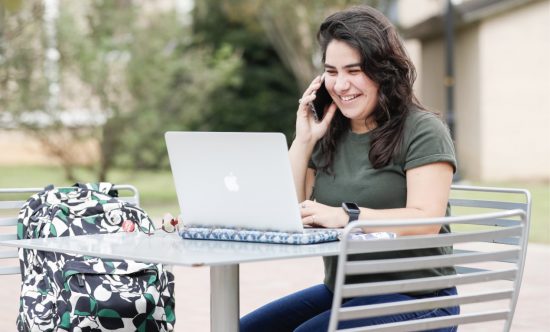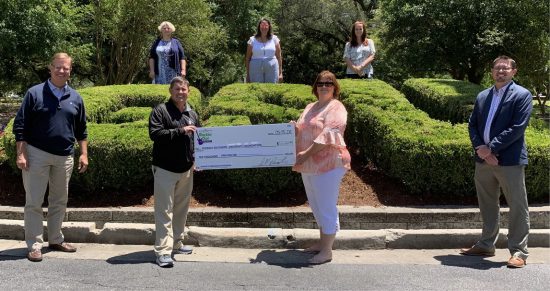A Simple Phone Call
Georgia Southern Students Helping Seniors During Pandemic and Beyond with Telephone Reassurance Program

Sometimes a simple phone call can improve a person’s day. The Senior Companion Program at Georgia Southern University is aiming to improve the days of many older adults in the area as a part of the Love In Action telephone reassurance program, which is funded by a grant from Rockin’ Out Alzheimer’s Disease Foundation (ROAD).
Jaqueline Miranda, a master’s student in the Experimental Psychology program, said the goal for the telephone reassurance program is to create friendships between volunteers and older adults, rather than simply providing an interaction. As student coordinator for Love in Action, she was usually the first person called if there was
an issue.
She said her favorite part of the program was when skeptical older adults were won over by the student volunteers.
“I made a phone call to one older adult in particular who originally was particularly adamant about not returning to the program,” Miranda said. “She was incredibly lonely, and although she spoke of stepping away from the program, more than anything she voiced her desire to have a friend and someone to talk to. As our conversation began to come to an end, the older adult agreed to stay in our program and thanked me for my patience and being an ear to
talk to.”
Sociology major Tanaja Armendariz, who was one of the first students to call people in the program, has enjoyed the experience of getting to know more older adults.

The ROAD Foundation presents a check to Love In Action for their telephone reassurance program. Pictured are (Back row, L to R) Faculty members Marieke Van Willigen, Ph.D., Adrienne Cohen, Ph.D., and Jennifer Zorotovich, Ph.D. (Front row, L to R) ROAD Foundation executives Darron Burnette, CFO, and Chandler Dennard, CEO, Senior Care Program Coordinator Deb Blackburn and Ryan Schroeder, Ph.D., Dean of the College of Behavioral and Social Sciences.
“My favorite part is calling them or their families and just explaining what the program is about,” Armendariz said. “I like just letting them know that there are people out there who are willing to help in any way that they can. I guess I like giving
people hope.”
Older adults are among the most vulnerable people during the COVID-19 pandemic, as in-person visits have been limited or stopped altogether. The telephone reassurance program will allow the Senior Companion program to provide assistance to seniors who have been on their waiting list, as well as others in the community.
“The telephone reassurance of the student callers will not only be an opportunity to brighten someone’s day, but also creates a social tie, which research shows improves health and longevity,” said Love In Action Director, Deb Blackburn. “I am also hopeful that this intergenerational contact will give some students a new appreciation for
older adults.”
Darron Burnette, who is the Chief Financial Officer of ROAD, started the foundation in 2012 in an effort to raise money in memory of his mother who had Alzheimer’s disease and passed away that same year. ROAD has given money it has raised to a variety of organizations related to Alzheimer’s research and the treatment of people with dementia, including multiple groups at Georgia Southern. He said the COVID-19 pandemic created the opportunity for ROAD to support the Love in Action program.
“During COVID-19, we were trying to figure out how we could help people out there,” Burnette said. “We felt like there was an immediate need for us to seek out the Senior Companion Program because of their involvement through the telephone.”
ROAD co-founder and Chief Executive Officer, Chandler Dennard, said the Senior Companion Program aligned perfectly with ROAD’s vision, which is to help senior citizens with dementia, as well as caregivers who are caring for dementia patients
at home.
“According to the Alzheimer’s Association, 83% of the help provided to older adults in the United States comes from family members, friends or other unpaid caregivers,” Dennard said. “Nearly half of all caregivers who provide help to older adults do so for someone living with Alzheimer’s or another dementia, so looking at that statistic this program fits perfectly. The money will provide the necessary resources for the program to thrive and to continue to impact the community.”
Senior Child and Family Development major Mashonda Jolley’s biggest takeaway from the program was how much it helps the caregivers in addition to the patients.
“My favorite experience was talking to a lady who had been waiting to hear back from one of the programs, and she was the caregiver of her mother,” Jolley said. “She thanked me and asked me more about the program. We talked for a while about how impactful this program is and will be in the future. She talked about how it helps the caregivers so much and how it made her day to get a call about the program.”
Armendariz said Love in Action has strengthened her belief in the value of helping others in need.
“I’m just hoping to reach the people who are in need of help and get them the services they need,” she said. “People should never be isolated and kept away from resources they need. What I will take away from this experience is a positive attitude, and I’ll always lend a helping hand.” – Kyle Dawson
